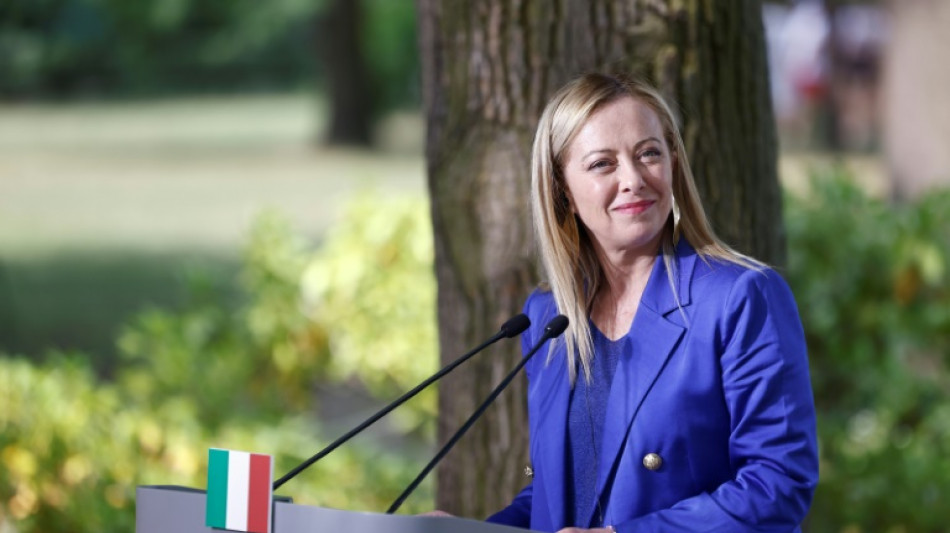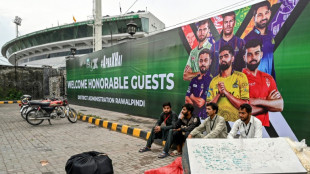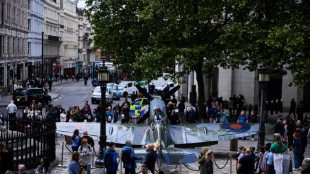
-
 Putin evokes WWII victory to rally Russia behind Ukraine offensive
Putin evokes WWII victory to rally Russia behind Ukraine offensive
-
China exports beat forecasts ahead of US tariff talks

-
 Leo XIV, the 'Latin Yankee', to celebrate first mass as pope
Leo XIV, the 'Latin Yankee', to celebrate first mass as pope
-
Most stocks lifted by hopes for US-China talks after UK deal

-
 IPL suspended indefinitely over India-Pakistan conflict: reports
IPL suspended indefinitely over India-Pakistan conflict: reports
-
German lender Commerzbank's profits jump as it fends off UniCredit

-
 Rare bone-eroding disease ruining lives in Kenya's poorest county
Rare bone-eroding disease ruining lives in Kenya's poorest county
-
India says repulsed fresh Pakistan attacks as de-escalation efforts grow

-
 Zhao's historic snooker title sparks talk of China world domination
Zhao's historic snooker title sparks talk of China world domination
-
'High expectations': EU looks to Merz for boost in tough times

-
 Poisoned guests rarely invited before deadly mushroom lunch, Australia trial hears
Poisoned guests rarely invited before deadly mushroom lunch, Australia trial hears
-
China sales to US slump even as exports beat forecasts

-
 Indian cricket to make 'final decision' on IPL over Pakistan conflict
Indian cricket to make 'final decision' on IPL over Pakistan conflict
-
Dethroned Bundesliga champions Leverkusen face uncertain future

-
 China can play hardball at looming trade talks with US: analysts
China can play hardball at looming trade talks with US: analysts
-
French monuments in trouble while PSG prepare for Champions League final

-
 Newcastle face Chelsea in top five showdown, Alexander-Arnold in spotlight
Newcastle face Chelsea in top five showdown, Alexander-Arnold in spotlight
-
Flick's Barca must show 'hunger' in crunch Liga Clasico

-
 Clasico the last chance saloon for Ancelotti's Real Madrid
Clasico the last chance saloon for Ancelotti's Real Madrid
-
Timberwolves overpower Warriors to level series

-
 Chinese fabric exporters anxious for US trade patch-up
Chinese fabric exporters anxious for US trade patch-up
-
Putin gears up to host world leaders at lavish army parade

-
 Nearing 100, Malaysian ex-PM Mahathir blasts 'old world' Trump
Nearing 100, Malaysian ex-PM Mahathir blasts 'old world' Trump
-
Leo XIV, first US pope, to celebrate first mass as pontiff

-
 Asian stocks lifted by hopes for US-China talks after UK deal
Asian stocks lifted by hopes for US-China talks after UK deal
-
Former head of crypto platform Celsius sentenced 12 years

-
 Ex-model testifies in NY court that Weinstein assaulted her at 16
Ex-model testifies in NY court that Weinstein assaulted her at 16
-
Nestlé and OMP Showcase Approach to Future-Ready Supply Chain at Gartner Supply Chain Symposium/Xpo in Barcelona

-
 Genflow Biosciences PLC Announces Share Subscription, Director's Dealing and Update
Genflow Biosciences PLC Announces Share Subscription, Director's Dealing and Update
-
Argo Blockchain PLC Announces 2024 Annual Results and Restoration of Listing

-
 'Great honor': world leaders welcome first US pope
'Great honor': world leaders welcome first US pope
-
Pacquiao to un-retire and fight Barrios for welterweight title: report

-
 Trump unveils UK trade deal, first since tariff blitz
Trump unveils UK trade deal, first since tariff blitz
-
Man Utd one step away from Europa League glory despite horror season

-
 Jeeno shines on greens to grab LPGA lead at Liberty National
Jeeno shines on greens to grab LPGA lead at Liberty National
-
Mitchell fires PGA career-low 61 to grab Truist lead

-
 AI tool uses selfies to predict biological age and cancer survival
AI tool uses selfies to predict biological age and cancer survival
-
Extremely online new pope unafraid to talk politics

-
 Postecoglou hits back as Spurs reach Europa League final
Postecoglou hits back as Spurs reach Europa League final
-
Chelsea ease into Conference League final against Betis

-
 Pope Leo XIV: Soft-spoken American spent decades amid poor in Peru
Pope Leo XIV: Soft-spoken American spent decades amid poor in Peru
-
First US pope shared articles critical of Trump, Vance

-
 'Inexcusable' - NBA champs Boston in trouble after letting big leads slip
'Inexcusable' - NBA champs Boston in trouble after letting big leads slip
-
US automakers blast Trump's UK trade deal

-
 Stocks mostly rise as US-UK unveil trade deal
Stocks mostly rise as US-UK unveil trade deal
-
Trump presses Russia for unconditional 30-day Ukraine ceasefire

-
 Anything but Europa League glory 'means nothing' for Man Utd: Amorim
Anything but Europa League glory 'means nothing' for Man Utd: Amorim
-
'Inexcuseable' - NBA champs Boston in trouble after letting big leads slip

-
 Pope Leo 'fell in love with Peru'and ceviche: Peru bishop
Pope Leo 'fell in love with Peru'and ceviche: Peru bishop
-
Pakistan's T20 cricket league moved to UAE over India conflict


As Italy turns again to Africa, 'good coloniser' myth persists
Italy's government is eyeing Africa in pursuit of energy security, even as some officials defend Rome's often-bloody colonial past on the continent -- giving short shrift to historical accuracy.
Historians agree that hundreds of thousands of civilians were killed under Italian colonial rule in Libya, Ethiopia, Eritrea and what is now Somalia from the late 19th century to the first half of the 20th.
Yet Italy's deputy foreign minister, Edmondo Cirielli, said in June that the country's presence on the continent was "civilising", without bloodshed or repression.
"Whether before or during Fascism... (Italy) in Africa built and created a civilising culture" in its colonies, said Cirielli, a member of Prime Minister Giorgia Meloni's post-Fascist Brothers of Italy party, borrowing the "good colonisers" myth popular on the far right.
"Our ancient and thousand-year-old culture does not make us a people of pirates who go around plundering the world," Cirielli said, in comments that raised eyebrows among historians and the left-wing opposition.
Unlike Germany reconciling with its Nazi past or France with its occupation of Algeria, Italy has been slow to embark on public soul-searching about its colonial history.
But opposition lawmakers have now drafted a bill to establish a "Day of Remembrance for the victims of Italian colonialism" in the four African countries.
The suggested date is February 19, which marks the start of a massacre of Ethiopian civilians by Italian troops in Addis Ababa in 1937.
"Other countries such as Belgium and Germany have apologised for the crimes of colonialism," said Laura Boldrini, an MP for the centre-left Democratic Party who co-authored the bill.
"In Italy, we tend to deny and tell ourselves that 'Italy, good people' built roads, hospitals and schools," she said.
Boldrini, a former head of the lower house of parliament, said right-wing newspapers had written disparaging articles about the text, "and this government does not take colonial crimes seriously".
The bill has little chance of being adopted given the opposition of Meloni's coalition, which has a parliamentary majority.
- 'History of violence' -
Alessandro Pes, a professor of contemporary history at the University of Cagliari, said the "stereotype of the 'good coloniser' has no significant historical foundation".
Rather, that rhetoric "hid a desire for colonial expansion carried out through the use of violence and the forced subordination of colonised populations", Pes told AFP.
Italy's eyes turned to expansion after it became a unified state in 1861, with the young nation anxious to establish a toehold in Africa in competition with other European powers.
It sought "to resolve the big problems of unemployment and social malaise in Italy" by exporting workers to newly occupied territories in the Horn of Africa, said Uoldelul Chelati Dirar, a professor of African history at the University of Macerata.
Differing from its European rivals, however, Italy developed more infrastructure like roads, bridges and railways while in Africa -- something right-wing politicians are quick to point out, he said.
Those investments have fuelled the "good people" myth that is deeply rooted in Italian society, "reflected in the extreme resistance to accepting the evidence that our history has also been a history of violence, exploitation and racism", added Pes.
British historian Ian Campbell estimates that Italy's occupation of Libya, Ethiopia, Eritrea and then-Italian Somaliland caused 700,000 African deaths.
This includes 150,000 people killed in Libya alone during the Fascist era under Benito Mussolini, Chelati Dirar said.
- Educational gap? -
In 2008, Silvio Berlusconi, then prime minister, signed a deal with Libyan dictator Muammar Gaddafi to pay $5 billion in investments to compensate for what the premier called "damage inflicted on Libya by Italy during the colonial era".
But little is taught in Italian schools today about this aspect of its past, prompting some historians to make a link between an educational gap and modern-day racism.
Meanwhile, Meloni has criticised Italy's European partners and fellow colonial powers -- without naming them -- during speeches addressed to African nations, as she seeks new deals on energy and access to raw materials.
Earlier this month in the Republic of Congo, she called for "an approach that is not the predatory and paternalistic one that has characterised relations with certain countries in the past".
L.Durand--AMWN


